Status Of Jointness In Indian Security Apparatus
- 2016 |
- Monograph
 Jointness and integration of the military is an inevitable requirement for the modern-day battlefield. The principles underlying these features are inter-service cooperation and economy of effort, both of which are crucial to war fighting. The lack of jointness and integration in the Indian armed forces received an impetus post Kargil. The Kargil Review Committee and Group of Ministers on National Security highlighted the pitfalls in the existing system and made a number of recommendations. Of these, the three most important ones were: appointment of a Chief of Defence Staff (CDS); creation of unified commands; and integration of the service headquarters (HQ) with the Ministry of Defence (MoD). Though integration of the service HQ with MoD has been carried out, it is almost entirely superficial/cosmetic. The other two recommendations have not been implemented. Apart from appointing the CDS, a reorganization of the military to form unified commands would serve to integrate operations and bring greater synergy to the military effort. The appointment of CDS remains imperative and in the long-term perspective, unified commands will have to be planned and raised as well. This monograph analyses status of jointness in Indian armed forces by examining the evolution of jointness in the armed forces of USA, UK and China. It attempts to establish the necessity of appointing a CDS and unified commands to enhance jointness and integration at the strategic and operational levels, so as to conduct future wars in the framework of integrated operations. While dwelling on the essential arguments for and against CDS and unified commands, the narrative outlines various options available to India for appointing a CDS and establishing unified commands.
Jointness and integration of the military is an inevitable requirement for the modern-day battlefield. The principles underlying these features are inter-service cooperation and economy of effort, both of which are crucial to war fighting. The lack of jointness and integration in the Indian armed forces received an impetus post Kargil. The Kargil Review Committee and Group of Ministers on National Security highlighted the pitfalls in the existing system and made a number of recommendations. Of these, the three most important ones were: appointment of a Chief of Defence Staff (CDS); creation of unified commands; and integration of the service headquarters (HQ) with the Ministry of Defence (MoD). Though integration of the service HQ with MoD has been carried out, it is almost entirely superficial/cosmetic. The other two recommendations have not been implemented. Apart from appointing the CDS, a reorganization of the military to form unified commands would serve to integrate operations and bring greater synergy to the military effort. The appointment of CDS remains imperative and in the long-term perspective, unified commands will have to be planned and raised as well. This monograph analyses status of jointness in Indian armed forces by examining the evolution of jointness in the armed forces of USA, UK and China. It attempts to establish the necessity of appointing a CDS and unified commands to enhance jointness and integration at the strategic and operational levels, so as to conduct future wars in the framework of integrated operations. While dwelling on the essential arguments for and against CDS and unified commands, the narrative outlines various options available to India for appointing a CDS and establishing unified commands.
About the Author
Vijai Singh Rana was commissioned into the Mechanized Infantry in 1989 and has had varied operational, staff and instructional experience. He has commanded a Mechanized Infantry Battalion, been a Brigade General Staff Officer (GSO1) of a Mountain Brigade on the Line of Control ,and has been an instructor at Officers Training Academy (OTA), Chennai, and at the National Defence Academy (NDA), Khadakwasla. He has also served in Sierra Leone for a year.
Download Monograph
Keywords: Joint Military Exercise





